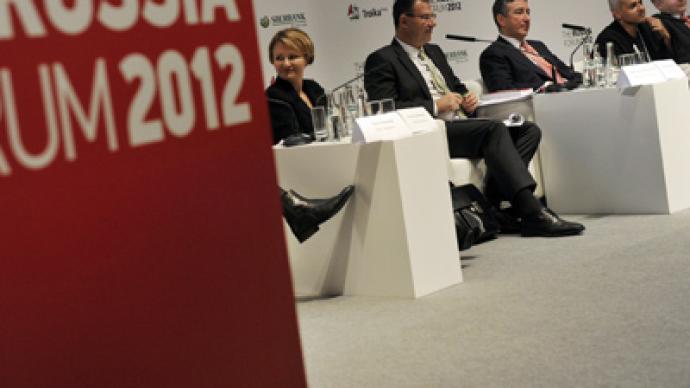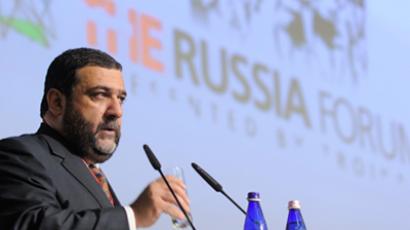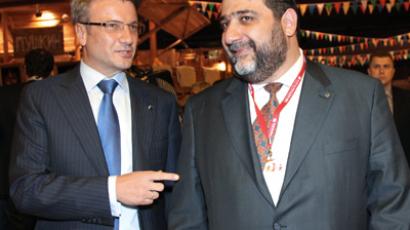Finance gurus say Russian economy must do better

Could do better is the ‘end of term’ report on Russia from experts meeting at the Russia Forum 2012 in Moscow.
They all agree Russia should be a successful within the world economy, but it still isn’t using the cards it’s been dealt efficiently. “Russia is a very good space and ironically what were its weaknesses now become its strengths, because it is not as integrated in the global economy as some people like it to be”, says Satyajit Das, the author of “Extreme Money”. “But the other important thing that it is rich in two things: the first it is rich in energy, the second it has got very strong agriculture and recent growth was underpinned by agriculture. And those two things will serve you very well…And of course, Russia has very strong defence industry,” he added.But the strong parts of Russian economy such as oil, gas and raw materials, as well as strong state protectionism keep it from modernization, experts warn. Sergey Guriev, the rector of Russian New School of Economy stressed, the dependence on oil could negatively affect the rouble:“The Russian currency is a paper version of oil. But we shouldn’t overestimate our confidence in the rouble, if oil prices go down, the rouble will definitely go down.”Raghuram Rajan, Professor of Finance at the University of Chicago, says Russians should be laid back just because they have lots of land and resources.“The key issue is overdependence on commodities and how do you make a break from that to utilise the population to become more innovative”, he said.“State capitalism works at the early stages of growth, when a lot of has to be done. It also works in industries like extraction industries. But it becomes much more difficult for innovative enterprises to have a bureaucracy”. Former Russian Finance Minister Alexey Kudrin is of one mind with Mr Rajan: “We provide subsidies and benefits incoherently. We have favourites who get these benefits. It should be significantly cut.”The need for Russia to move from a resources-based economy to a production-based one has been voiced by the government, country’s politicians and economists. “The fast growing emerging market countries are countries which have developed broad base industries that are able to send a range of reasonably sophisticated products to the world. Russia still remains very much a commodity exporter and we don’t see a Samsung in Russia, we don’t see the kinds of export capabilities that are developed in Brazil”, says Economics Professor Charles Wyplosz.Some experts question the Russian resource-based economy belongs with the other emerging BRIC countries: Brazil, India, and China. The idea was voiced by economist Nouriel Roubini at the World Economic Forum in Davos, but many disagree.“I think we should interpret some of what he says as a provocation for the Russian authorities and Russian policy makers to increase the pace of reform as Russia is faced with severe challenges as is the world economy,” said Marcos Troyjo, Director of the BRICLab at Columbia University. Roubini also emphasized the country needs “structural reforms, direct investment, privatisation and less government interference in the economy”.Creating a healthier investment environment along with more effective judicial system are essential to attract investments and to boost business, experts underlined. Sberbank Chief German Gref believes the changes will come after the Presidential elections in Russia. “The investment climate in Russia will definitely change it’s impossible that it will remain as it is. We are in 120th place worldwide for investment attractiveness,” said Greff at the Troika Dialog Forum. “I believe in a positive trend, but it should improve quick enough to overtake rivals. And this will depend on the efficiency of a future government”.Professor Rajan says it’s the private sector and small business that should be driving the economy. “Russia led the world in a number of technologies. How to rewind this innovation but in a private sector?That to my mind is the key, because the world needs innovation. How do you bring it to Russia? Create small companies, enterprises, they will employ the smart people here”.Joining to WTO will also contribute to Russia’s economic development, though some sectors would be challenged, experts say. With WTO accession the Russian economy could grow 3-11% depending on the time frame, according to David G. Tarr, Consultant and Former Lead Economist at the World Bank. “But I think the right approach is not to subsidise declining sectors, which defeats the purpose of liberalization, but rather to focus on people. If people are laid off you need to develop programs to help them find the better and higher paying jobs”, he added.














